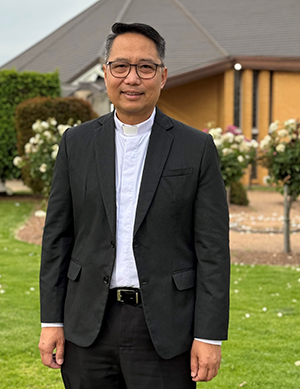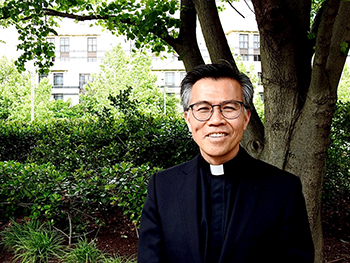The National Centre for Evangelisation recently asked two of Australia’s newest bishops to share their personal reflections, experiences and knowledge regarding evangelisation.
 Bishop Rene Ramirez RCJ (Auxiliary Bishop of Melbourne)
Bishop Rene Ramirez RCJ (Auxiliary Bishop of Melbourne)
What are some of the most effective methods of evangelisation that you have seen?
In my Australian experience, ALPHA was effective. I initially misunderstood it, thinking it was a content delivery program. It’s not. It creates an opportunity for people to listen and then vulnerably share their thoughts on the topics of the ALPHA video series, where different people respond to the same question, which does not necessarily have to align with Christian beliefs. In the end, any tool might be useful aside from the ALPHA video series, like ‘Search’ or ‘Sycamore’, but the objective must be clear. The series should aim to foster meaningful connections between the organisers and participants and among the participants themselves. It is through these connections that trust is built, which, in my opinion, is vital to the work of evangelisation.
What does the ordinary lay Catholic individual need to be able to evangelise effectively?
Primarily, it is about having an encounter and personal relationship with Jesus. Since one cannot give what they do not possess, it's difficult to recognise the Spirit's movement in someone who is merely filled with information from the catechism or other books, without a personal encounter and relationship with the Lord himself.
What are some practical ways that individual Catholics can contribute to the Church’s evangelising efforts?
Foster a culture of invitation. When a Catholic accepts the challenge of being a host – whether by inviting someone to a church hall gathering, a lecture, or a celebration – they assume the responsibility of welcoming and caring for the guest. This often builds a foundation of trust, encouraging the invitee to become curious about how the host’s courage and responsibility manifest in their hosting role.
Be prepared and generous, avoiding hesitation in sharing our spiritual gifts. These might include stories of grace, encounters with the Lord, moments when we felt God’s nearness, or times when our prayers were answered.
What are some of your personal charisms that assist you in evangelisation, and how do you apply them?
My APEST profile indicates that my strengths in ministry lie in teaching and being apostolic, which I find aligns with my daily life. In small ways, while visiting schools and meeting children for confirmation, I ensure they hear the kerygma that Jesus is not just Savior, Teacher, and Master. There appears to be a gap in our catechesis; for example, when I ask grade 6 students in our Catholic schools if Jesus is also God, they often respond collectively with a big no! When this first happened, I felt disappointed and disheartened. Now, I take time in each class to clarify this key point of our faith, hoping that principals and religious education leaders are listening and will consider this as a point of focus when engaging with their students. Hopefully, next year, they will ensure their students understand it correctly. Without our children knowing these truths, how will they appreciate God’s love and Jesus’ sacrifice? It diminishes the depth of our faith if children haven’t heard these core truths in school.
What insights and wisdom can we learn from the elderly in our communities regarding evangelisation?
I once heard of a course for elderly priests in the Philippines organised by the Bishops' Conference titled 'Best Wine Served Last'. The facilitator mentioned that as we age, our metabolism naturally slows down, including our physical mobility. This could also be seen as the Lord’s invitation for the elderly to adopt a more contemplative stance before God. Elderly communities have accumulated a wealth of life experience. It would be interesting to explore what more strongly draws them to their faith. I believe they would say they've had many realisations, and ultimately, only God remains faithful – He alone is consistent and deeply interested in us. If we could easily accept this truth, I think we would all be drawn to the immense love, beauty, and goodness that is God itself.
Bishop Thinh Nguyen (Auxiliary Bishop of Melbourne)
 What are some of the most effective methods of evangelisation that you have seen?
What are some of the most effective methods of evangelisation that you have seen?
One of the most effective methods of evangelisation is creating opportunities for an encounter with Christ, which is the ultimate purpose of evangelisation. Such encounters can take many forms, as guided by the Holy Spirit – through prayer, the sacraments, Eucharistic adoration, Scripture, works of mercy, acts of charity and service, retreats, inspirational talks, Bible study, personal reflection, bold proclamation of the kerygma, and sharing of personal testimony.
What does the ordinary lay Catholic individual need to be able to evangelise effectively?
To evangelise effectively, the ordinary lay Catholic must first renew and deepen their own faith, allowing it to be a source of strength and inspiration for others. Evangelisation begins with the individual and is ultimately directed toward others through the power of the Holy Spirit. It is not about preaching in grand ways, but about being a living witness – sharing the Gospel through everyday actions rooted in faith and charity. As the saying goes, “we cannot give what we do not have”; therefore, cultivating a personal relationship with Christ and living a life of integrity and love is essential for helping others encounter the faith.
What are some practical ways that individual Catholics can contribute to the Church’s evangelising efforts?
Individual Catholics can contribute to the Church’s evangelising mission in many practical and meaningful ways. One of the most powerful is through the Christian witness of everyday life – living with integrity, kindness, and joy that naturally draws others toward Christ. Catholics can also help by creating an atmosphere of invitation, hospitality, and trust, making others feel welcome and valued within the community. Fostering collaborative relationships and teamwork, along with a shared sense of mission, strengthens the Church’s outreach. It also allows lay Catholics to play a vital role in the Church’s evangelising efforts.
What are some of your personal charisms that aid you in the task of evangelisation, and how do you use them?
One of my personal charisms in the task of evangelisation is effective leadership rooted in missionary discipleship. This involves a prayerful and honest discernment of the current state of the parish – whether it is operating in maintenance mode, focused on self-preservation, or actively oriented toward mission and evangelisation. I strive to re-evaluate ministries, programs, and activities to ensure they are fostering true missionary discipleship rather than merely running on routine. Another key aspect of this leadership is to integrate evangelisation principles into existing pastoral plans, so they become part of the parish's ongoing life rather than a separate initiative. Finally, I believe that when the liturgy is celebrated with reverence, beauty, and full participation, it becomes a powerful moment of encounter that both strengthens the community and opens a door to evangelisation.
How can the laity best support clergy in the task of evangelisation?
The laity can best support clergy in the task of evangelisation by becoming active partners in mission, inspired by a shared vision, personal witness, and deep commitment to the Gospel. Laypeople are called to inspire others through the way they live, becoming visible signs of God’s love in the world. A powerful contribution is made when we intentionally reach out to those who are absent from our communities – our missing brothers and sisters – and invite them back to the table, especially through personal invitations to Mass and parish life. Evangelisation also begins in the home. The family is the “domestic church”, the first and most vital community where faith is nurtured and shared. In the family, we learn to pray, encounter Jesus, and discern God’s will, forming the foundation from which we go out into the world as witnesses to Christ. When the laity live this calling with joy and conviction, they offer immense support to clergy, helping to build a vibrant, missionary Church.



